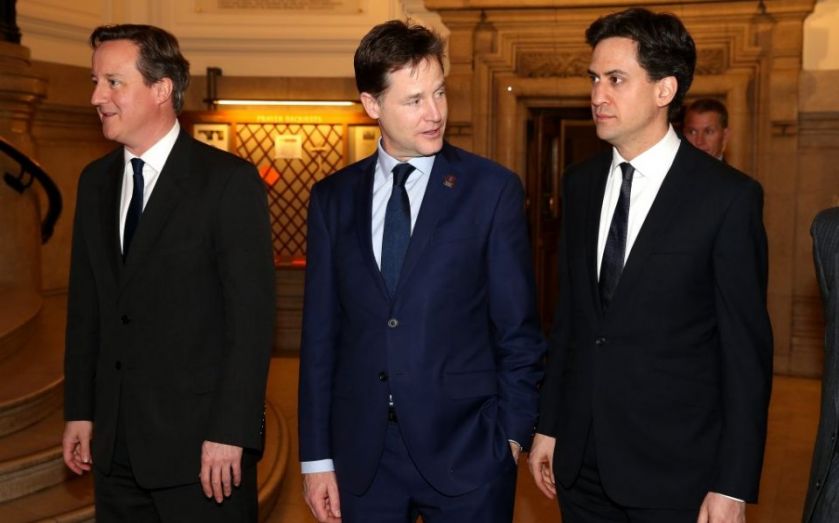General Election 2015: What the parties are offering small business

Before the 2010 General Election, Britain’s small business community was a rather uncoordinated mass, largely invisible to the political elite. This time around, the UK’s 5m small firms can’t and won’t be overlooked. This newly-drawn constituency has legs, and we know how to use them.
In a brave small business world, the party that can show it has understood the full impact of this revolution will have the upper hand. And the Small Business Debate tonight is the new set-piece in the run-up to the election, organised and run by a small firm – Enterprise Nation. It will see political heavyweights outline their small business manifestos in front of an engaged entrepreneurial audience.
While Vince Cable may have dropped out, it still promises to be the only debate focused on the needs of the small. Business minister Matt Hancock, shadow minister for small business Toby Perkins, the Lib Dem ambassador for women in enterprise Lorely Burt, Ukip’s small business spokesman Margot Parker, and the Green Party’s spokesman on business, innovation and skills Howard Allen will all be there.
The event is happening partly in recognition of the fact that there are now record numbers of small firms in the UK, with more than 184,000 new businesses registered in Greater London in 2014 alone, according to the StartUp Britain tracker. Small firms employ an estimated 11.4m, 47 per cent of total UK private sector employment. They are the hard-working backbone of Britain.
So what can we expect from the debate? While the Tories have unveiled new pledges – like the Help to Grow scheme and an extension to the British Business Bank, more funds for the Start Up Loans scheme, a Prompt Payment Code, and a shake-up of government procurement to make it more accessible to smaller firms – Labour has hinted that it would extend the Prompt Payment Code, exposing FTSE 350 companies to public scrutiny on payment terms.
If elected, Labour says it would also introduce a Small Business Administration, modelled on the eponymous US version – aimed at ensuring new firms have access to government schemes. The party also proposes to reduce business rates for 1.5m small companies and then freeze them, and create a Business Investment Bank with a regional network.
What of the rest? The Lib Dems largely echo the existing work of the coalition around the extension of the Business Bank, but want to see a green innovation element introduced. They would also continue to ring-fence the science budget and invest more in Catapault – an initiative designed to bridge the gap between universities, research institutions and business.
And the Greens? Not much is out there in terms of detail, but they are certainly in favour of local business. In fact, they would allow councils to impose extra business rates on out-of-town supermarkets, to fund small local firms. A cut in rail and bus fares by an average of 10 per cent would also help those firms using public transport.
Ukip wants to increase free local parking, investigate how education can create a more useful workforce, and simplify planning regulations and licences for empty commercial property vacant for over a year.
In the shadow of the recession, small businesses find it easier to retain vitality than their corporate counterparts. They are more agile, less complex and more likely to see growth.
But while big business has an established route to the heart of government, there’s a growing need for the small business community to have its demands taken more seriously and be given more consideration than has hitherto been the case in some circles.
I’m looking forward to hearing how politicians feel they have understood the contribution small firms make, and finding out if their offering to these companies recognises the way modern businesses start up and grow – starting from home, growing by outsourcing, going global, and subcontracting.
Emma Jones MBE is founder of Enterprise Nation and was co-founder of StartUp Britain. She is also chair of the trustee board for careers platform Plotr.
The debate will be held in the Great Hall, ICAEW, Moorgate Place. For tickets and details, visit www.enterprisenation.com/thedebate